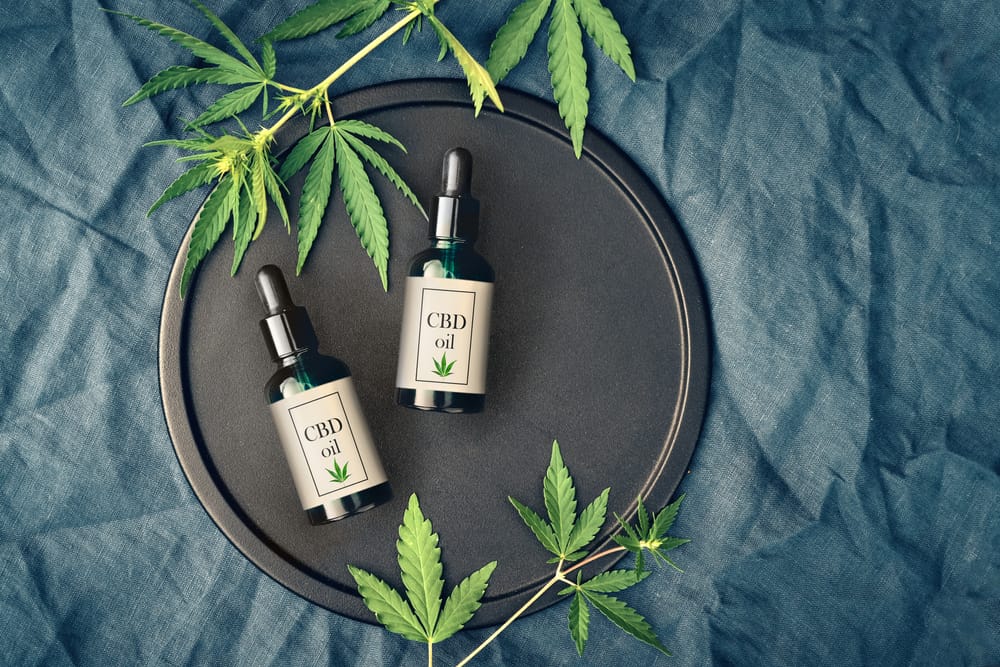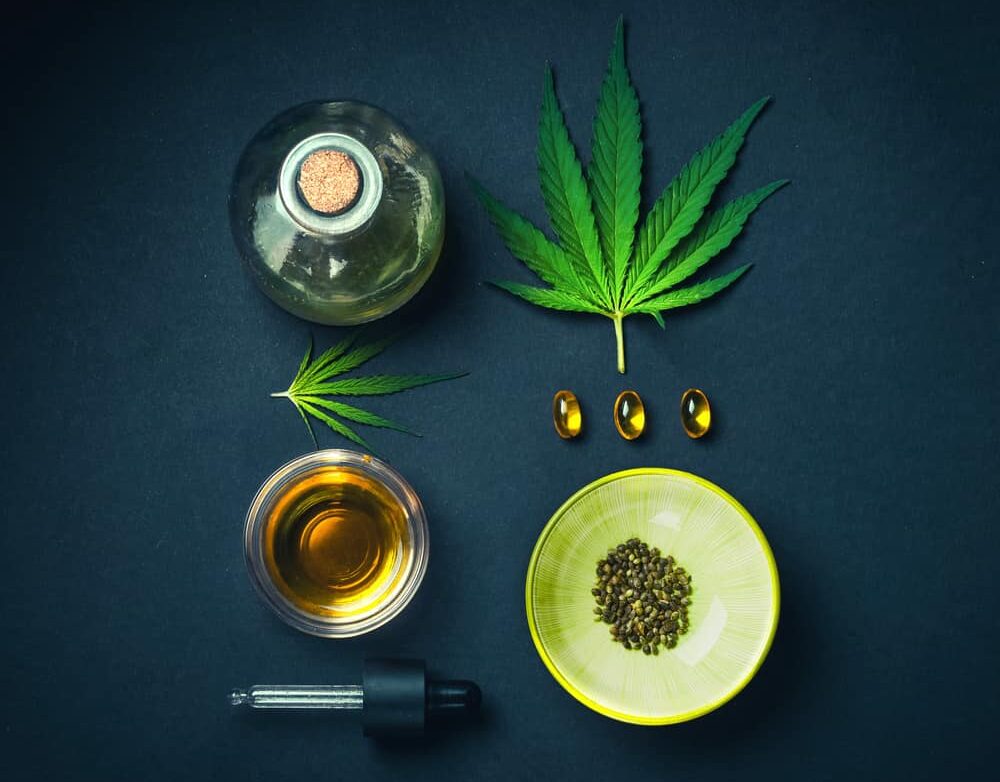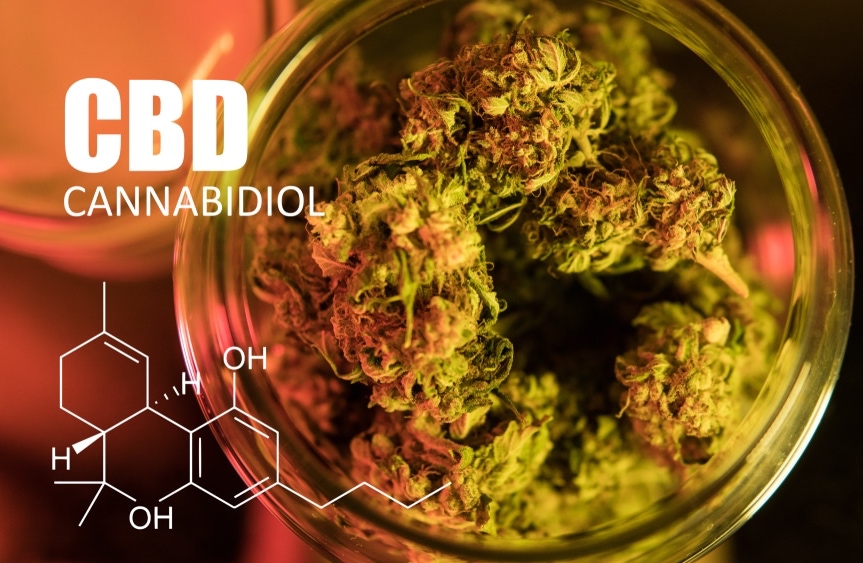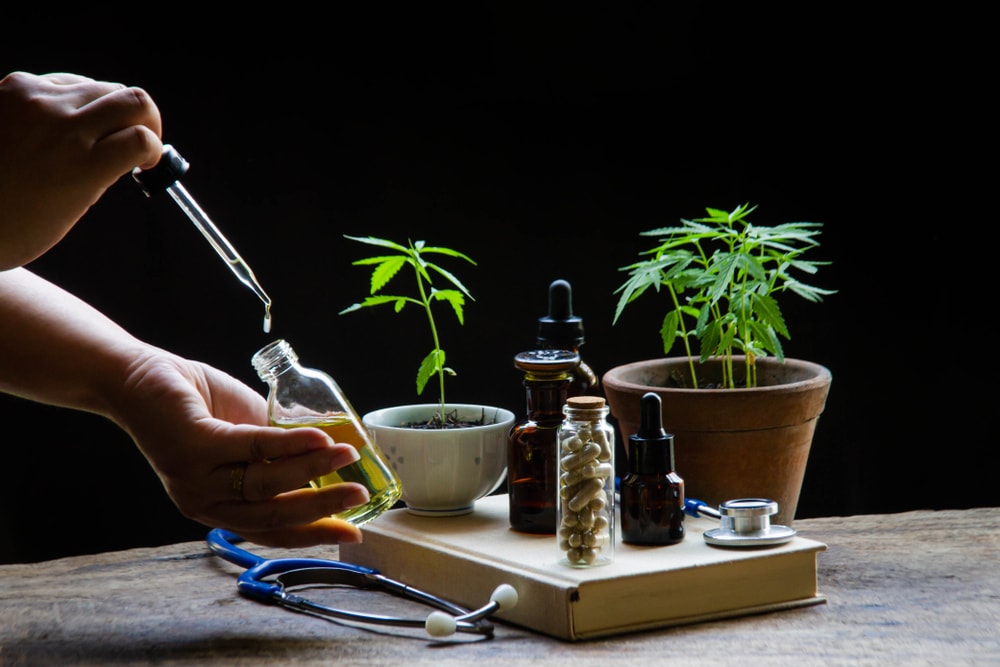Insomnia? Then this article is a must-read because here is a background on what CBD is as well as ways it impacts your mind, body, and sleep. In the post, we’re going to reveal if the CBD really helps with sleep disorders, how it works, how to use it, what benefits and risks exist. So, check the article before using cannabis for insomnia.

What are cannabinoids and CBD?
Let’s start from the very beginning and define what CBD is. Do you know that a cannabis plant on average contains about 113 various chemical compounds or so-called cannabinoids with such famous tetrahydrocannabinol (THC) and cannabidiol (CBD) included? There is no similar plant because the ratio and concentration of the cannabinoids depend on the strain, how and where it has grown.
Today it’s no secret that THC and CBD have different impacts on your body and mind. Being psychoactive, both cannabinoids affect the brain but in different ways. Therefore, THC gets you high meanwhile CBD remains non-impairing. It’s a reason that CBD is used as medical marijuana for the treatment of a variety of conditions like depression, insomnia, anxiety, chronic pain, and other diseases and disorders.
The endocannabinoid system and sleep
The endocannabinoid system and sleep
Therefore, each cannabinoid interacts with your endocannabinoid system — a network of cannabinoid receptors in the central nervous system and brain. Herewith, the system maintains certain body functions and state of balance/stability/homeostasis like:
- Appetite;
- Mood;
- Regulating circadian rhythms that affect the quality and duration of your sleep, etc.
Consuming marijuana, active compounds of the cannabis interact with CB1 and CB2 receptors of the endocannabinoid system, providing different effects. Here with, CBD may affect sleep and wake cycles along with relieving pain, stress, anxiety, etc.
How do CBD and cannabinoids work?
New and still poorly understood marijuana effects on sleep make it vital to do more and deeper research to learn how exactly cannabinoids (with CBD included) work and how marihuana helps you sleep. What we know now is that CBD along with cannabinoids of the plant interact with proteins and cells in your brain so that it can improve the quality of sleep as well as prolong sleep. Yet, there are a lot of questions left to answer.
What does the research say about CBD and sleep?
Does marijuana affect your sleep? Several studies and researches were conducted in the last decade to answer the question. There are a number of studies that prove that you can use cannabis as a sleep aid.
Before we start to elaborate on the studies, first and foremost, it’s vital to establish the reasons for your sleep disorder. According to the data, there can be such reasons for insomnia as:
- Medications. Some medications you take can disturb the sleep/wake cycle.
- Physical conditions. Chronic pain, restless leg syndrome, etc. can also cause poor sleep.
- Mental health disorders. Nightmares, bad and/or short sleep can be provoked by post-traumatic stress disorder (PTSD), anxiety, depression, and so on.
- Environmental factors. In case you have an uncomfortable bed, continuous loud noises (living near the airport, trail station, factory, etc.) that stress you out can cause sleep disorders as well.
CBD can be helpful when insomnia is caused by the mentioned external factors. Below you’ll find the information about the recent studies and their results to make things clear.

According to the investigation, CBD can reduce the level of cortisol. It’s a hormone of stress that helps us to wake up in the morning and also it can be a reason for insomnia. As the results of the research demonstrate:
- 160 mg of CBD oil can prolong sleep duration;
- 40, 80, and 160 mg of CBD plus 5 mg of the placebo (nitrazepam) helped the participants to fall asleep.
Another study showed that CBD oil can act as a sedative, decreasing cortisol level, when its dosage was 300-600 mg.
There was another research conducted in 2019 with 72 participants involved (25 experiencing poor sleep and 47 — anxiety) to explore the effects of CBD oil combined with the other medications prescribed. Here are the results of the 3-months study:
| Follow-up | Improved sleep (%) | Worsened sleep (%) |
| First month | 66.7 |
25
|
| Second month | 56.1 | 26.8 |
| Third month | the results are very close to the previous follow-up results | |
Using the doses of CBD in the range from 25 mg to 175 mg, the researchers found that the most effective dosage of CBD oil for sleeping exceeds 25 mg and was close to the maximum. Though cannabis can be helpful for sleep disorders in the short term, you should be ready that the effects can be not sustained. What’s more, the effectiveness of CBD depends on your current medication.
Thanks to the results of the investigations conducted in 2014, 2017, and 2018, we also know that CBD oil can:
- Affect the sleep cycle and improve the symptoms of RBD (REM sleep behavior disorder);
- Be helpful in treating grogginess, excessive daytime sleepiness, etc.;
- Reduce chronic pain and cortisol that also can help you sleep and/or prolong the sleep duration.
How to use CBD for sleep?
Currently, there is a wide variety of CBD products in different formats to use for medical purposes and not only. Depending on the location and CBD type, cannabis for sleep can be legal or not. Let’s check 3 main CBD types to keep in mind:
- Full-spectrum: all the cannabinoids, flavonoids, and terpenes are saved in the extract. Thus, you will get both THC and CBD compounds.
- Broad-spectrum: In this case, the extract contains all the beneficial compounds within the plant along with CBD but THC — it is removed here. This type is the best choice for those who take regular drug tests or a THC-free approach is required/preferred.
- CBD isolate: all the compounds of the plant are removed, leaving only CBD.
The way of consumption, as well as dosage of marijuana as a sleep aid, depends a lot on the CBD type used. Below you’ll find some general principles of using CBD oil for insomnia and cannabis for sleep disorders.
How to take CBD oil for sleep?
CBD oil — is cannabidiol that is extracted from the cannabis plant (hemp or marijuana). Usually, Sativa strains are used for CBD production. So, if you think about what to choose Indica or Sativa for sleep, now you know the answer. Besides that, the THC ratio depends on the way it was harvested. Thus, hemp CBD contains less THC than marijuana because it comes from the seeds/stalks of the cannabis plant.

Besides that, there are different forms of CBD to use for the treatment of sleep disorders, including:
- Edibles: it includes different types of edibles infused with CBD oil like cakes, cookies, lollipops, ice cream, CBD gummies for sleep, and so on. Commonly, the concentration of CBD for edibles is counted in milligrams.
- Oils: CBD and hemp oil for sleep that can be used for any way of consumption.
- Tinctures: you can add a few drops of the liquid to the drink like tea, for example.
- Vape concentrates and extracts: all the cannabis CBD products that can be added to vaporizer or vape pen for further inhaling.
- Pills and capsules with CBD: usually, it’s medicinal marijuana for insomnia.
Alert! Another crucial fact to keep in mind that CBD concentration can vary from product to product. Herewith, learn the label, dosage, instruction, and check the THC:CBD ratio before using cannabis for insomnia.
How much CBD oil to take before bed?
There are a lot of factors to consider when calculating how much CBD oil for sleep to take, including:
- Your physical parameters (age, weight, etc.);
- The nature of your sleeping troubles;
- Personal body chemistry;
- Other medications involved.
Warning! Also, you should be ready that what works for somebody is quite likely won’t work for you. So, you need to find your perfect approach and combination of a form, dosage, and time. General dosing guidelines recommend 1-6 mg of CBD per 5 kg of body weight and 25-1,500 mg of CBD per day. The best practice is to start with microdosing and gradually increase it so that you feel the improvement. Also, don’t forget to consult with your doctor before you add cannabis for insomnia.
When to take CBD?
Not only the dosage and form of CBD matters but the timing. So, when is the best time to consume CBD to get the desired effects? Currently, it’s considered that it’s better to take CBD oil 30 minutes up to 1 hour before you go to bed.

Note that it’s recommended to eat/vape/smoke before bed consistently for at least 1 week or even longer, otherwise, you won’t feel any changes. Try to be systematic and gauge if you feel any improvement. Adjust the timing and dosing of CBD oil before bed if it’s required.
Side effects and other risks of CBD
According to the studies, CBD oil is considered to be well-tolerated. However, it can interact with other medications you take that can lead to some negative effects though. Mind the fact that there are no regulatory bodies that control the quality of CBD products. That means there is no guarantee of safety, effectiveness, and quality of the CBD oil/product sold.
That’s why it’s your concern to read the labels, check the companies that produce CBD oil, and so on to find the best CBD oil for insomnia. What’s more, depending on your individual sensibility and dosage used, you can experience the following side effects:
- Dry mouth;
- Fatigue;
- Drowsiness;
- Diarrhea;
- Reduced appetite;
- Changes in weight, etc.
Summary
It’s a fact that CBD helps with sleep troubles, however, everything is not so simple. If it works for someone there is no guarantee that it will work with you. However, it’s up to you to give it a try or not. Here are a few tips to mind in case you’re going to use cannabis as a sleep aid:
- First and foremost, you should take into account CBD side effects and CBD risks that can take place.
- If you want to try marijuana as a sleep aid then visit a doctor for a consultation to consider all the medication you take, your individual sleep problems, state of health, and other conditions.
- Be careful and work out your approach starting with the low dosage of CBD oil to sleep better.
- Take CBD within 1-2 weeks or even longer until you feel any effects/improvements.
- Learn the best strains for sleep and specify the dosage of the definite CBD oil before using it.
FAQ about CBD for sleep
Is marihuana for sleep legal?
Cannabis legal status varies from country to country. Yet, due to the fact that it can be used for medical purposes in some jurisdictions, that CBD can be legally used. So, if you’re going to use cannabis to treat sleep disorders, then check the laws first, see the doctor, get a prescription if needed, etc.
Why can't I sleep, is it because of marihuana?
Even if marihuana helps you sleep, it doesn’t exclude the possibility it will bring the opposite effect. It can be caused by the strain, dosage, form used. According to the research conducted in 2014, it was found that CBD could promote wakefulness. Yet, it wasn’t stated why and how CBD oil/product promoted wakefulness in some instances.
What form of CBD is most effective?
Though there are several ways to consume CBD for sleep, vaping is the most effective way to take CBD. In such a way the cannabis compounds get into your system faster than any other forms. Always, check and follow the instructions to avoid respiratory risks.




